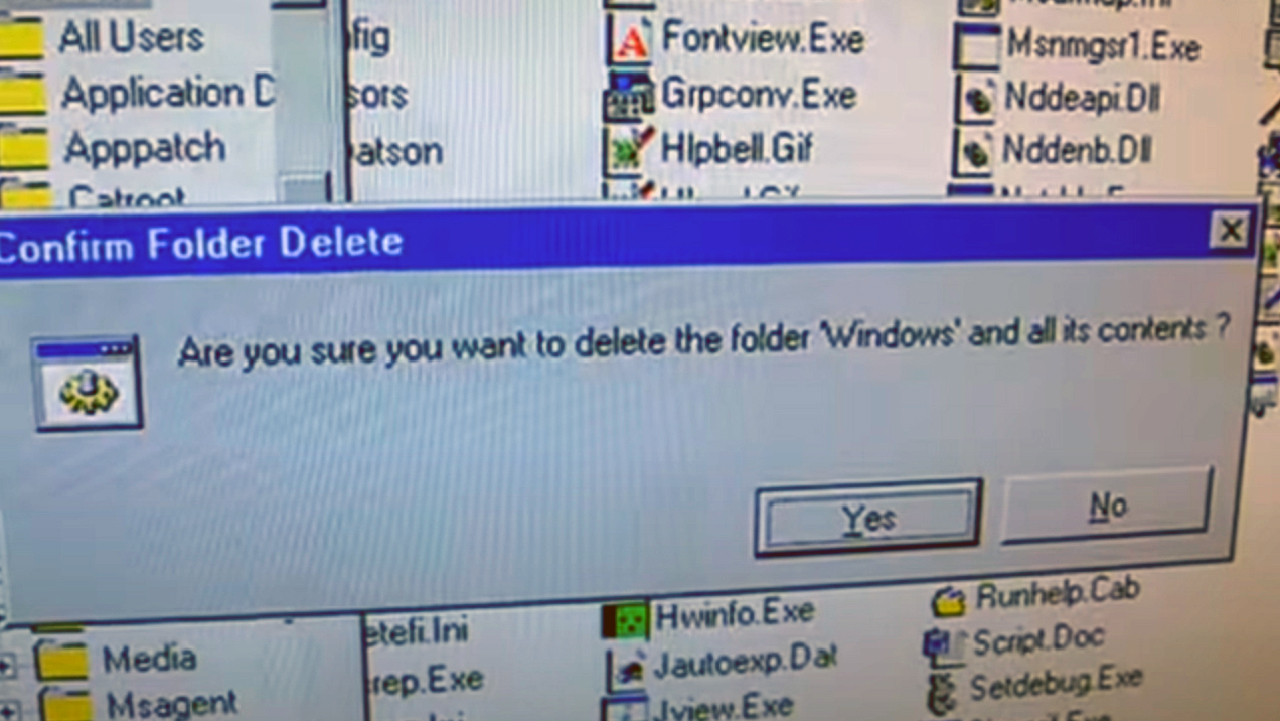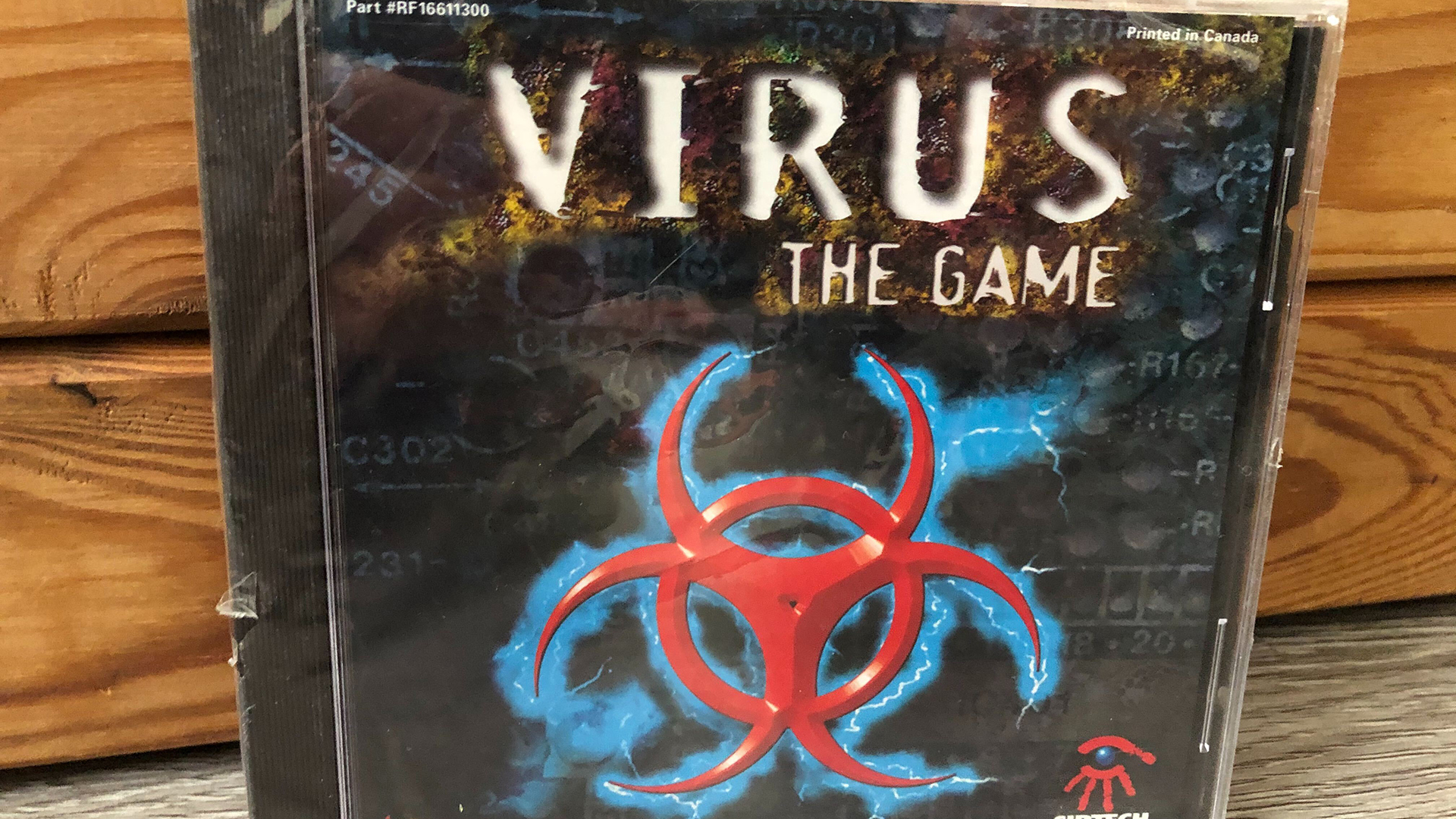How a videogame ad posing as a computer virus scarred me for life
A random tweet finally put to rest the 20-year mystery of the fake virus that emotionally destroyed me as a child.

There have been some terrible videogame marketing campaigns over the years, but none rival the sheer terror induced by Virus: The Game. The premise of this 1997 FPS is clever: It turns the unique file system of your PC into a 3D world that you explore, blasting in-game viruses that are actually graphic representations of the files on your hard drive. But Virus' developers took that clever theme a little too far when it came to advertising the game. Instead of just running TV commercials or print ads like normal humans would, the company created and shared a fake virus that pretended to delete every program on your computer the moment you opened it. If it sounds terrifying, that's because it was. I was one of the victims of Virus: The Game's awful marketing ploy, and it took me 20 years to realize it.
Curiosity killed the PC
Though my exact memory is a little hazy, my nervous system remembers the complete and total panic that lanced through my body.
I can't remember the exact age I was when I encountered Virus: The Game's fake virus, but I was young enough to think that downloading suspicious software off of Limewire was a good idea. This peer-to-peer shareware tool came on the heels of Napster, and, along with Kazaa, was the best way to share music in the early 2000s.
I was one of the millions of preteens out there on the internet, illegally downloading Sum 41's Fat Lip and The Offspring's Walla Walla, but Limewire was so much more than that. It was a portal to all kinds of strange places—most of them horrifying—including an entire world of pirated games. Like a lot of kids, my parents resented the amount of time I spent gaming and tried to curb my hobby by rarely buying them. Discovering that I could just download full-priced games for free on Limewire was a revelation.
To circumvent CD keys, many pirated games used keygens. These programs were created by hackers in the warez community and could generate fake CD keys to bypass a given game's DRM.
To a poor preteen with a dubious moral compass, keygens made me feel cool. Compared to most beige, boring Windows programs of the era, keygens were alive with colorful, artistic user interfaces that blasted chiptune music through your speakers. But keygens weren't a perfect solution because each one was individually created for a specific game. Even worse, Limewire had no real way to verify the contents of a file before downloading. Unlike most torrent sites, there was no comment section warning you to steer clear, and I was too young to really understand how to protect my family computer from unwanted viruses. Downloading keygens was like digging for buried treasure in a minefield.
So you can imagine my surprise after school one day when I came across a "universal keygen" on Limewire. Oh my god, I thought, finally. A way to circumvent the need to ever download another keygen again. Shrugging off the too-good-to-be-trueness of it, I threw all caution to the wind. After a few minutes of downloading, my shiny universal keygen was ready to start spitting out every CD key I could dream of.
That's not what happened, though.
The biggest gaming news, reviews and hardware deals
Keep up to date with the most important stories and the best deals, as picked by the PC Gamer team.
When I ran the program, I wasn't treated to bouncy chiptunes or flashy graphics. I just remember seeing a window showing the contents of my C: drive and a prompt asking if I wanted to delete the Windows folder. Though my exact memory is a little hazy, my nervous system remembers the complete and total panic that lanced through my body.
This wasn't just my personal computer. It belonged to my entire family—including my father who, at the time, had launched a risky online business that he poured his entire soul into. Roughly a year earlier, I had cost my parents a few hundred dollars in repair fees when I had accidentally moved every file in our C: drive into Limewire's media folder while trying to import a song, causing the entire system to break. I couldn't fathom how pissed my dad would be if it happened again.
Just as my mouse cursor reached the window to press no, though, the prompt closed itself automatically and was replaced by a progress bar showing the program meticulously deleting every file. I frantically tried to close the window and exit the program, but nothing was working. Seconds later, everything was gone. A new prompt informed me that there was no system software left and the only option was to shut down the computer. I started sobbing uncontrollably. The screen turned an ominous black, I wanted to throw up. A second or two passed, and then green text appeared on the screen: "Thank god this is only a game."
I didn't see much of the image that popped up after that because, realizing something was fishy, I finally remembered I could just reboot the computer manually. After seeing everything was okay, I walked away. But I couldn't stop crying, and it took hours before I stopped shaking from the fear that I had almost torpedoed my family PC a second time. Though I don't remember uninstalling the program, I never dared to open it again. I had learned my lesson for good: Stop downloading shady shit from Limewire.
Mystery solved
That memory has stayed with me for 20 years. I've told this story dozens of times, but I was always mystified by what that program really was. As I got older and learned more about computers, I speculated that it might've been some kind ad for antivirus software, but I was never sure. What's worse, every time I told a friend about what happened, I was always nagged by the paranoia that they didn't believe me. The story sounded so far-fetched that, as I got into my late 20s, I even started to question whether this had happened at all.

But today this 20-year mystery was laid to rest by PC Gamer's Evan Lahti—and he didn't even realize what he was doing. Earlier today, I had tweeted about the excellent early access game Hardspace: Shipbreaker, and how an in-game explosion was so big it actually caused my PC to crash. That tweet randomly triggered Evan's memory of Virus: The Game. When he tweeted back at me with a link to its Wikipedia article, which contains a section dedicated entirely to its controversial marketing stunt, I couldn't believe it.
It wasn't a cruel joke, but a terrible ad for what would become an entirely forgettable shooter. The program, I now know, is called JepRuss (or simply Russ) and was released years before I encountered it alongside the game. Naturally, people weaponized JepRuss and began sharing it around. It's one of many types of malware that don't actually harm your computer but instead mess with victims in all sorts of creative ways. Googling its name, it's funny to see so many antivirus databases with entries about it, describing what it does and how to remove it.
That someone thought this was a good way to advertise a game is baffling. Even if I had waited long enough to actually read what was on my screen after the fake virus was done, I doubt I would have found it funny. I definitely wouldn't have wanted to actually buy the game. But I can't fully convey what it's like finally being able to get closure on one of the oldest mysteries in my life.
With over 7 years of experience with in-depth feature reporting, Steven's mission is to chronicle the fascinating ways that games intersect our lives. Whether it's colossal in-game wars in an MMO, or long-haul truckers who turn to games to protect them from the loneliness of the open road, Steven tries to unearth PC gaming's greatest untold stories. His love of PC gaming started extremely early. Without money to spend, he spent an entire day watching the progress bar on a 25mb download of the Heroes of Might and Magic 2 demo that he then played for at least a hundred hours. It was a good demo.


